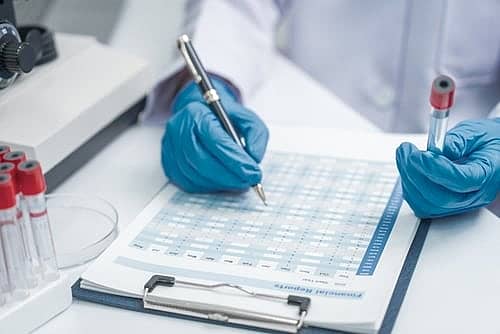Over 55 municipalities located in Massachusetts fall under the jurisdiction of the Massachusetts Water Resources Authority (MWRA) for industrial wastewater discharge. If your facility is in a location covered by the MWRA, depending on the type of permit held, MWRA sampling may be required by the end of the year.
For Category 2 MWRA permit holders, semi-annual wastewater sampling for the July through December sampling period must be conducted by December 31, 2023. The sampling analysis must be done by an independent laboratory with DEP certification or accreditation from the EPA’s National Environmental Laboratory Accreditation Program (NELAP).
Sampling and analysis must follow applicable EPA approved procedures, with chain of custody documentation showing submission to a certified laboratory. A certified laboratory may substitute another sampling analysis method (listed in 40 CRF Part 136) if approved or otherwise authorized by the MWRA and EPA.
The analytical testing laboratories will submit the results of the wastewater sampling directly to the MWRA via the MWRA’s electronic reporting system (Web SMR). The permit holder is required to provide a Sample Analysis and Reporting Certification Form to the laboratory authorizing the electronic data submittal. A copy of the form can be found in the facility’s MWRA permit or on the TRAC website.
Even though the sampling results are sent directly to the MWRA by the analytical testing laboratory, permit holders are responsible for reviewing the results as soon as they are received and notifying their local MWRA Industrial Coordinator of any issues of non-compliance. If the sampling results show that any regulated chemical is detected above the discharge limits specified in the facility’s permit or the Sewer Use Regulations (360 CMR 10), the MWRA must be notified (at 617-242-6000) within 24 hours of becoming aware of the violation. The report showing the violation must also be submitted.
360 CMR 10.024 specifies the specific daily maximum discharge limitations for regulated pollutants including formaldehyde, cyanide, phenol, specific metals, and listed toxic organics for both the Metropolitan Sewerage Service Area and the Clinton Sewerage Service Area.
If a violation is identified, the permit holder is responsible for repeating the sampling and submitting the subsequent analysis to the MWRA within 30 days. Before conducting re-sampling, the permit holder should investigate the cause of any results above discharge limits. The source of the elevated discharge needs to be determined, and corrective measures put in place to prevent any reoccurrence of the non-complying discharge.
In addition to conducting sampling, Category 2 MWRA permit holders are required to submit a semi-annual report, including pH and flow logs for July through December 2023, by January 31, 2024. The report should be submitted using an MWRA Submittal Form.
Companies holding an MWRA General Permit (Low Flow and Low Pollutant) are not required to conduct semi-annual sampling and therefore do not have a December 31 sampling deadline. However, General Permit holders are required to conduct sampling within 60 days of the permit issuance date for new and renewed permits. It’s important to note that for General Permit holders, the sampling results are not submitted directly to the MWRA by the analytical lab and must be sent to the MWRA by the permit holder. General Permit holders are also responsible for reviewing the sampling results and notifying the MWRA of any issues of non-compliance.
For both types of permits, copies of all sampling reports are required to be kept on file with the permit holder for at least 3 years.
For additional information on MWRA sampling requirements, or for assistance with reviewing and interpreting your MWRA sampling results, please contact us.
This blog was written by Beth Graham, Director of Quality, Research, and Training


